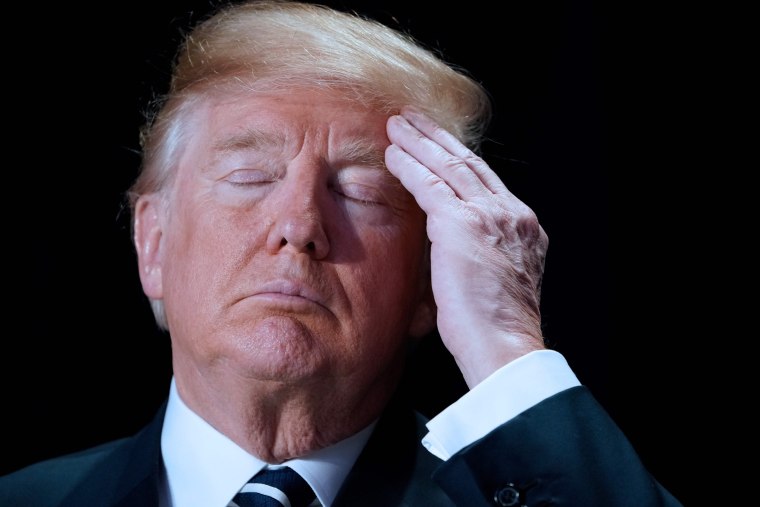News analysis
WASHINGTON — For more than a year, President Donald Trump has insisted that Russians did not interfere in the 2016 election, going so far as to call such allegations a "hoax" and a "made-up story."
On Friday, special counsel Robert Mueller, the man charged with investigating the Trump team, filed indictments filled with cold, hard fact, charging 13 Russian nationals with executing an incredibly sophisticated cyber-based operation to aid Trump's bid for the presidency.
In other words, Mueller called Trump's bluff.
The defendants "engaged in operations primarily intended to communicate derogatory information about Hillary Clinton, to denigrate other candidates such as [Sen.] Ted Cruz [R-Texas] and [Sen.] Marco Rubio [R-Fla.], and to support Bernie Sanders and then-candidate Donald Trump," Mueller wrote.
The indictment does not say that Trump's campaign worked with the Russians, and at one point says that the Russians communicated with "unwitting" officials in the campaign. Nonetheless, on a political level, Mueller's story is devastating to Trump's narrative of a false-flag conspiracy to discredit him. And it could serve as a warning to Republicans to tread carefully in defending the president in the coming months.
"If anything, the indictment reinforces Trump’s lack of credibility on Russian interference in the election by giving a jaw-dropping account of the time, money and effort exerted by the Russian government on American soil to influence the election," said Elise Jordan, an MSNBC political analyst and former National Security Council aide.
"There’s no question now that it was a Russian state operation," she added.
In the hours after the announcement, the radio silence from the White House — and from Trump's Twitter account — was deafening. And then, shortly after 3 p.m. ET, Trump abandoned the "hoax" narrative in favor of a different defense.
"Russia started their anti-US campaign in 2014, long before I announced that I would run for President," he wrote on Twitter. "The results of the election were not impacted. The Trump campaign did nothing wrong — no collusion!"
Before that, the task of defending the president fell to Kayleigh McEnany, a spokeswoman for the Republican National Committee. The longtime Trump surrogate pointed to the indictments' finding that Russians put together anti-Trump rallies after the election as evidence that the president's operation didn't coordinate with them before voters went to the polls.
"BREAKING: DOJ reveals Russians organized AGAINST Trump on Nov. 12th and 19th of 2016!!" she wrote on Twitter. "Mark today as the day that the Democrats' Russia-Trump collusion conspiracy theory unraveled!"
Similarly, John Dowd, the president's outside counsel, praised Mueller.
“Very happy for our country," Dowd told NBC News. "Bob and his team did a great job.”
But neither Trump nor his White House aides indicated that they would push for any security reforms to combat election tampering by Russia or other countries.
And Malcolm Nance, an MSNBC terrorism analyst, countered Trump's timeline.
"Wrong," Nance wrote on Twitter. "Russia decided operations just after Miss Universe announcement in June 13. Hired main staff after Miss Universe In Nov 13. Worked full time naming Trump as their candidate fm 2015-2016."
Though Mueller has yet to prove those charged broke the law — much less that the Trump campaign coordinated with Russian actors — the level of detail in the indictments leaves little doubt that there was an ambitious effort to influence voters' behavior, often on Trump's behalf.
For example, Mueller charges that the defendants posed as Americans to gather information from political operatives about how to target their efforts to swing states, built fake social media personas into so-called leaders of public opinion and created online communities around issues such as immigration and the Black Lives Matter movement. They even paid an actress to portray an imprisoned Hillary Clinton at campaign rallies, according to the charging documents.
In such a close election, it's difficult to pinpoint a single cause for Trump's victory and Clinton's defeat. Trump's long-held position that Russian actions didn't significantly interfere with the election spoke to the political implications if foreign actions had influenced the outcome.
From a legal standpoint, though, the results are irrelevant to the question of whether anyone broke the law. And they don't matter to the question of whether and how the U.S. will combat future incursions into elections.
Sen. Rob Portman, R-Ohio, said that concern should be a priority for lawmakers.
"This announcement is a positive step toward holding Russia accountable for its efforts to undermine our democracy," he said. "We must not forget that this is one small part of the larger process of understanding the extent of ongoing Russian disinformation and influence operations against the United States and our allies."
And Jake Sullivan, who served as the top policy aide to Clinton and was Vice President Joe Biden's national security adviser, told NBC News that the revelations should act as a catalyst for lawmakers.
"I genuinely hope this motivates Congress to act to defend America against this ongoing threat to our democracy," he said.
